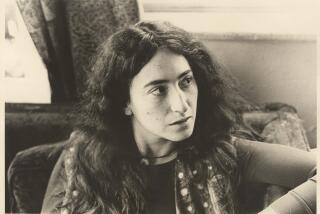HBO’s ‘Norma Jean & Marilyn’ Reshuffles a Familiar Deck
Marilyn Monroe’s most celebrated visual is the billowy skirt shot from “The Seven Year Itch,” her most profound one from real life.
It was 1962. All eyes locked on Monroe, sewn snugly into a sparkly low-cut gown, white-lit in darkened Madison Square Garden and sequins aglow while serenading one of two Kennedy brothers with whom she evidently had been having clandestine affairs.
Her breathy cooing of “Happy birthday, Mr. President” in sexy character--if singing were seduction, this was it--still echoes hauntingly, a flash of TV memory symbolizing the contradictions defining Monroe and, not incidentally, the mythologized Kennedys. On stage, she was the voluptuous bombshell of romanticized legend; off stage, swirling desperation, a woman now umbilical cordless, soon to be fired from her last film, soon to be cut loose from Camelot, soon to die mysteriously at age 36.
She purrs posthumously, oodles of books, documentaries and movies about Monroe--most of them trashy--having surfaced since the mid-’80s. Newest is the well-mounted but spotty HBO film “Norma Jean & Marilyn,” which tells its story essentially through dueling Monroes played by talented young actresses Ashley Judd and Mira Sorvino (a recent Oscar winner for her work as the amiable hooker in “Mighty Aphrodite”).
Monroe was born Norma Jean Mortenson and this earlier incarnation (Judd) becomes the nattering inner demon whom Marilyn (Sorvino) constantly battles and tries in vain to pull away from. This two-actress device succeeds structurally because we can imagine the troubled Monroe being at times delusionary and hearing interior voices. And also because of the wide disparity between Norma Jean the wannabe and Marilyn, who sheds her old skin to become a movie star--cosmetic surgery, hair bleach, a name change and customized tutoring yielding Sorvino from Judd.
Although Monroe labored prodigiously to improve her acting, the capable comic star of “Bus Stop,” “Some Like It Hot” and some other films fades into the mist of Jill Isaacs’ dark teleplay. What you do get are the lifelong miseries, starting with a Norma Jean section that plods. Director Tim Fywell (so adroit in guiding the BBC’s “A Dark Adapted Eye”) pulls it together only somewhat after the arrival of Sorvino’s Marilyn.
Sorvino is especially worthy as the showier of these alter egos, this Marilyn persuasively walking the walk and talking the talk while buckling under years of psychological tonnage, yet ever aware of her sexual power and willing to tap it to advance her career.
“You move well,” she’s told by her enamored vocal coach, Fred Karger (Taylor Nichols). Cut to an open convertible where she is moving well . . . on top of him.
Clashing dialogues are a keen way to help unfurl a story. Yet this story is all-too-familiar, worn goods repackaged as Monroe herself was glossily re-wrapped for her date with glittery but gloomy movie queendom: Heavily burdened by her sordid upbringing, the driven, relentless goddess-to-be virtually wills herself Hollywood supremacy, shrewdly using others and getting used in a metamorphosis to ash-blond Marilyn from brunet Norma Jean, the new public face, affected speech and surface gleam hiding the same old private torment.
Insecurity. Self-flagellation. Loneliness. Depression. Bad marriages and affairs. The extended crackup. Booze. Pills, pills and more pills. Two hours and 10 minutes after you meet her, Monroe is being wheeled away by the 911 boys, and that’s that.
But of course, it isn’t.
Still hovering murkily 33 years later are unresolved questions about Monroe’s death (was it suicide, as ruled, or an accidental drug overdose or murder?), her widely reported trysts with President John Kennedy and Atty. Gen. Robert Kennedy at their brother-in-law Peter Lawford’s beach house, and related possible Mafia intrigues, all giving her odyssey a fascinating dimension missing from “Norma Jean & Marilyn.”
Just chewing on the possibilities gives you the willies while rerunning footage of Monroe making vocal love to the president in front of 15,000 Democrats attending that birthday bash at the Garden. Yet the Kennedys show up in the movie only as a relative footnote, the shady guys and the enigma surrounding Monroe’s death not at all.
As long as this old deck is being reshuffled, why not toss out the bare breasts--which the movie gives you aplenty--and instead include what is easily the most interesting and ominous element of Monroe’s story, the part with potentially dark implications for the Kennedys, to say nothing of the White House press corps that should not have been looking the other way?
These facets have surfaced in some documentaries. Still standing tallest is the BBC’s “Say Goodbye to the President,” a taut, mesmerizing, meticulously researched 1985 film, narrated by writer-director Christopher Olgiati, which is being resold in the United States with 20 additional minutes covering Monroe’s near-lethal, drug-binged stay at the Cal-Neva Lodge in Lake Tahoe on the last weekend of her life.
“She all but died there,” said Los Angeles-based executive producer Ted Landreth, who also asserts that it was during this weekend with the Lawfords that a devastated Monroe learned that Robert Kennedy was ending their affair, as John Kennedy had already done.
Landreth said the magazine series “Extra” is planning to air excerpts of the new material from “Say Goodbye to the President” on Sunday. The documentary deserves reshowing in its entirety. Beyond being just a sad figure, Monroe to some was a political volcano waiting to explode. Reported in terse BBC style, the original program implies that she may have been planning to go public about her affairs with the Kennedys and that she may have been visited by Robert Kennedy on the day she died. Foul play? Conspiracy?
Where is Oliver Stone when you need him?
* “Norma Jean & Marilyn” airs at 9 p.m. Saturday on HBO.
More to Read
Only good movies
Get the Indie Focus newsletter, Mark Olsen's weekly guide to the world of cinema.
You may occasionally receive promotional content from the Los Angeles Times.










